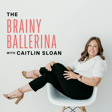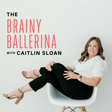
74. Pivot for Dancer’s Kaylee Randall on Redefining Success Beyond the Stage
Today’s conversation is one that every dancer - current or retired - needs to hear. I’m joined by Kaylee Randall, a former professional dancer who spent nearly a decade performing on cruise ships, in theme parks, and in Las Vegas. After an incredible performing career, Kaylee made a bold move to Australia in 2018, where she founded Pivot for Dancers, a platform dedicated to helping professional dancers find meaning off the stage and confidently step into their next chapter.
In this episode, Kaylee opens up about what it was really like to leave the professional dance world behind and how her own experience navigating that transition inspired the creation of Pivot for Dancers. We talk about the identity crisis and imposter syndrome so many dancers face after retiring, and how starting these conversations can help dancers connect on a deeply human level.
Kaylee also shares practical advice for performers who might be wondering what’s next. She encourages dancers to explore hobbies outside of dance, connect with non-dancers, and start side projects that might someday turn into a new career path. We also discuss how to identify and articulate the transferable skills dancers already have and how those skills can apply to surprising new fields (including coding!).
This episode is a must-listen for anyone standing at the edge of a career pivot or curious about what life after dance can look like. Kaylee’s perspective is empowering, grounded, and refreshingly real, reminding us all that the end of one chapter can be the beginning of something even more meaningful.
Connect with Kaylee:
@pivotfordancers on Instagram: https://www.instagram.com/pivotfordancers/
Pivot for Dancers on Youtube: https://www.youtube.com/@pivotfordancers
Links and Resources:
Etoile Dance Competition: 10% off registration with code “BRAINY10” - https://www.etoilecomp.com/
Let’s connect!
My WEBSITE: thebrainyballerina.com
INSTAGRAM: instagram.com/thebrainyballerina
Questions/comments? Email me at caitlin@thebrainyballerina.com
This episode was brought to you by the Pivot Ball Change Network.

